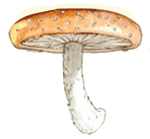Shiitake mushroom (Lentinula edodes)
Shiitake, an edible mushroom indigenous to East Asia, is cultivated worldwide for its purported health benefits

ALSO KNOWN AS: Forest mushroom, lentinula, black mushroom, hua gu.
BACKGROUND: Shiitake, an edible mushroom indigenous to East Asia, is cultivated worldwide for its purported health benefits. The fresh and dried forms of the mushroom are commonly used in East Asian cooking. It is also valued as a medicinal mushroom. Shiitake is popular in many countries around the world and is commonly found in supermarkets and Asian grocery stores.
Lentinan ([1,3] beta-D-glucan), a polysaccharide isolated from shiitake, is thought to be responsible for many of the mushroom's beneficial effects. An injectable form of lentinan is used for cancer treatment in some countries, but it has not been evaluated in large studies.
RESEARCH: In vitro studies conducted with lentinan have indicated its anticancer effects in colon cancer cells;[1] these effects may result from its ability to suppress cytochrome P450 1A enzymes that are known to metabolize pro-carcinogens to active forms.[2]
TAKE HOME POINTS
For additional information, visit the Memorial Sloan-Kettering Cancer Center Integrative Medicine Service website, "About Herbs," at
http://www.mskcc.org/AboutHerbs
.
Lentin, the protein component of shiitake, exerts antifungal properties, inhibits proliferation of leukemic cells, and suppresses the activity of HIV-1 reverse transcriptase.[3]
Studies of shiitake extracts suggest antiproliferative,[4] immunostimulatory,[4] hepatoprotective,[5] antimutagenic,[6] and anticaries[7] effects in vitro and in mice. But a clinical trial failed to show any benefit of an oral shiitake extract in the treatment of prostate cancer.[8]
More recently, however, improvements were reported in quality of life and survival with an oral formulation of superfine dispersed lentinan in patients with hepatocellular carcinoma,[9] gastric cancer,[10] colorectal cancer,[11] and pancreatic cancer.[12] Larger, well-designed studies are needed to determine whether oral lentinan is superior to the injectable form.
ADVERSE REACTIONS: None have been reported at normal doses. However, there have been a handful of case reports documenting adverse effects associated with shiitake in some way. Chronic hypersensitivity pneumonitis was observed in a lung cancer patient following exposure to shiitake spores.[13] Prolonged consumption of shiitake powder has resulted in dermatitis, photosensitivity,[14] eosinophilia, and gastrointestinal upset.[15] Intermittent skin eruptions (dermatitis), over a period of 16 years, were linked to consumption of shiitake mushrooms in a 45-year-old male.[16] Food allergy manifesting as esophageal symptoms was reported in a 37-year-old man following consumption of shiitake mushroom.[17]
References:
REFERENCES
1. Ng ML, Yap AT. Inhibition of human colon carcinoma development by lentinan from shiitake mushrooms (Lentinus edodes). J Altern Complement Med. 2002;8:581-9.
2. Okamoto T, Kodoi R, Nonaka Y, et al. Lentinan from shiitake mushroom (Lentinus edodes) suppresses expression of cytochrome P450 1A subfamily in the mouse liver. Biofactors. 2004;21:407-9.
3. Ngai PH, Ng TB. Lentin, a novel and potent antifungal protein from shitake mushroom with inhibitory effects on activity of human immunodeficiency virus-1 reverse transcriptase and proliferation of leukemia cells. Life Sci. 2003;73:3363-74.
4. Israilides C, Kletsas D, Arapoglou D, et al. In vitro cytostatic and immunomodulatory properties of the medicinal mushroom Lentinula edodes. Phytomedicine. 2008;15:512-9.
5. Akamatsu S, Watanabe A, Tamesada M, et al. Hepatoprotective effect of extracts from Lentinus edodes mycelia on dimethylnitrosamine-induced liver injury. Biol Pharm Bull. 2004;27:1957-60.
6. de Lima PL, Delmanto RD, Sugui MM, et al. Letinula edodes (Berk.) Pegler (Shiitake) modulates genotoxic and mutagenic effects induced by alkylating agents in vivo. Mutat Res. 2001;496:23-32.
7. Shouji N, Takada K, Fukushima K, Hirasawa M. Anticaries effect of a component from shiitake (an edible mushroom). Caries Res. 2000;34:94-8.
8. deVere White RW, Hackman RM, Soares SE, Beckett LA, Sun B. Effects of a mushroom mycelium extract on the treatment of prostate cancer. Urology. 2002;60:640-4.
9. Isoda N, Eguchi Y, Nukaya H, et al. Clinical efficacy of superfine dispersed lentinan (beta-1,3-glucan)
in patients with hepatocellular carcinoma. Hepatogastroenterology. 2009;56:437-41.
10. Oba K, Kobayashi M, Matsui T, Kodera Y, Sakamoto J. Individual patient based meta-analysis of lentinan for unresectable/recurrent gastric cancer. Anticancer Res. 2009;29:2739-45.
11. Hazama S, Watanabe S, Ohashi M, et al. Efficacy of orally administered superfine dispersed lentinan (beta-1,3-glucan) for the treatment of advanced colorectal cancer. Anticancer Res. 2009;29:2611-7.
12. Shimizu K, Watanabe S, Watanabe S, et al. Efficacy of oral administered superfine dispersed lentinan for advanced pancreatic cancer. Hepatogastroenterology. 2009;56:240-4.
13. Suzuki K, Tanaka H, Sugawara H, et al. Chronic hypersensitivity pneumonitis induced by Shiitake mushroom spores associated with lung cancer. Intern Med. 2001;40:1132-5.
14. Hanada K, Hashimoto I. Flagellate mushroom (Shiitake) dermatitis and photosensitivity. Dermatology. 1998;197:255-7.
15. Levy AM, Kita H, Phillips SF, et al. Eosinophilia and gastrointestinal symptoms after ingestion of shiitake mushrooms. J Allergy Clin Immunol. 1998;101:613-20.
16. Garg S, Cockayne SE. Shiitake dermatitis diagnosed after 16 years! Arch Dermatol. 2008;144:1241-2.
17. Goikoetxea MJ, Fernández-BenÃtez M, Sanz ML. Food allergy to Shiitake (Lentinus edodes) manifested as oesophageal symptoms in a patient with probable eosinophilic oesophagitis. Allergol Immunopathol (Madr). 2009;37:333-4.